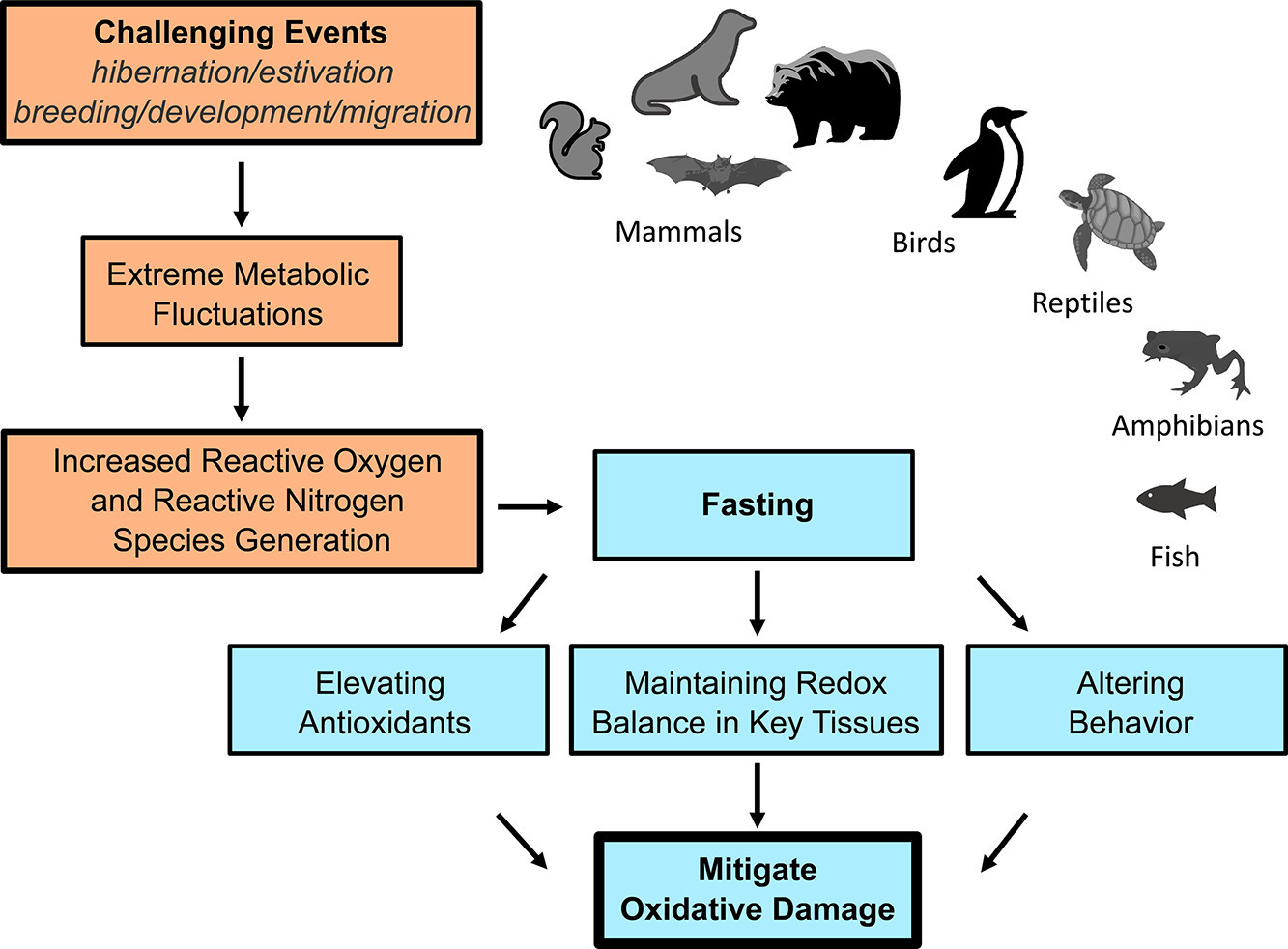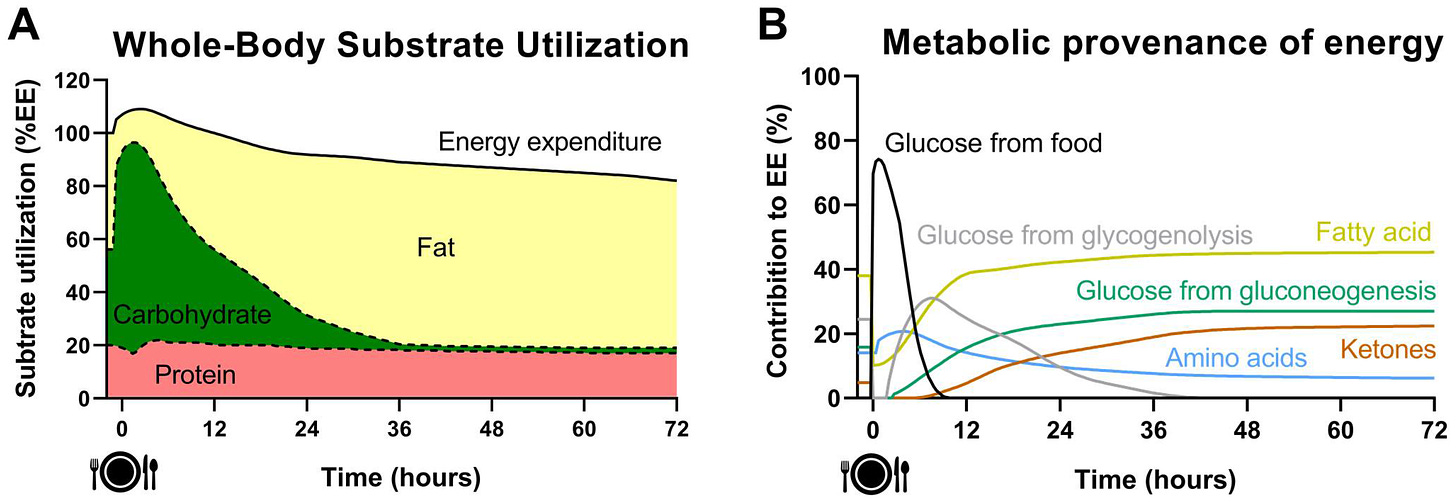Doctor's Heart Series Chapter 6 : Science of Fasting
Scientific explanation on benefits of Fasting/Caloric restriction.
Caution: Long read!
Alaska…
In the Far North, Arctic Ground Squirrel live well above the Arctic Circle in Alaska. Squirrel's unique ability is to hibernate(lack of food and water) for much of winter by dropping its temperature, heartbeats to 15/min, each respiration prolonged for a minute. They don't make excreta during this time and preserve every ounce of energy during the Hibernation. They hibernate due to the food scarcity, especially around Alaska(only a few months of warm temperatures and food). The ability to stay without food for months(sometimes 9 months) in times of adversity is very inherent to the mammalian species.
Like Arctic ground squirrels, many animals hibernate as part of the natural life cycle due to various reasons, including seasonal, food scarcity, migration, and water resources.
Cellular Mechanisms in Hibernation…
Now let us understand the mechanism of these animals undergoing Hibernation. The challenging event, including Hibernation, promotes cellular changes; we have to detour here to scientific explanation. Multiple events are happening during the Hibernation. Inside the Cell, the essential powerhouses are Mitochondria, which produce ATP. ATP is needed to generate energy inside the Cell, just as electricity is required to power the house. The consumption and utilization of oxygen in the formation of ATP results in Reactive Oxygen Species(ROS). The excess of ROS leads to oxidative stress( stress from the unstable atoms inside the Cell). The balance between ROS and Antioxidants is essential in nurturing the Cell. During fasting, one of the exciting things happens to be increased antioxidants and the balance of redox, which mitigates oxidative stress. Similar to animals, humans have the benefits of fasting.
Normal Physiology of Fasting…
As discussed, the various religious practices embedded in fasting as a ritual have continued for the millennia. They definitely might have found the magic of healing thru fasting.
Before talking about fasting, let's talk about the components of food. Food consists of Macronutrients and Micronutrients. Macronutrients consist of glucose, fats, and protein. They are all equally important functions as they are interconnected, and each one can give the energy to sustain life in need of an energy source. For example, glucose is an essential energy source without which life cannot support itself. Fats are crucial in maintaining cellular membranes and energy storage and transport of molecules and protein, which function as cellular building blocks called amino acids. Whereas Micronutrients consist of vitamins and minerals, essential for cellular health, immune makeup, bone health, etc.
Intermittent Fasting (IF) or Caloric restriction(CR) is defined as voluntary withholding of food for a certain period or restricting the calories. Like Animals, Humans can survive without food for a specific period. Angus Barbieri, a Scottish man, did the most extended fast of 382 days between 1965 to 1966 (I am not saying everyone should start fasting for a year). There are various methods of Intermittent Fasting (details next blog). As we all know, Intermittent fasting has gained popularity in the last decade or more. Therefore, it is essential to discuss the scientific explanation and benefits.
Fasting can be a day, 2 days, week to months, or more, but for the majority of people, I would say 99% cannot go beyond 3 days (especially when you have McDonald's everywhere); let us consider the 3-day fast (An ideal and easy thing to do compared to the longer fasts). The graph above illustrates the utilization of glucose or fats for energy as feeding vs. fasting states.
After feeding, the body starts to use up the immediate glucose present in the food. Once the ingested glucose starts to deplete, the liver glucose starts to utilize glycogenolysis(a mechanism to break down liver glucose). Later thru Gluconeogenesis(a means to provide glucose), glucose is maintained at baseline to support essential needs for the brain and other vital organs. At 24 Hrs., a metabolic switch starts to happen; glucose switch Ketones(fat stores melting) to provide a primary energy source; this occurs by Liver signaling fat storage to start mobilizing free fatty acids into ketones to be used for energy.
Insulin is the anabolic (building) hormone, and its primary job is to turn excess food into fat for future use. Insulin is a life-saving hormone without which humans wouldn’t have existed for a long time(Imagine storing food as abdominal fat and then giving energy until you find food). Now put this in perspective: eating every day, in fact, 3-4 times a day, insulin raises every time we eat, especially with refined carbohydrates, but it can also do protein and fat. Obesity rates are soaring all over the world(reason above). Insulin can be good and can also be equally harmful. Excess insulin leads to Diabetes, Inflammation, Atherosclerosis(Heart Disease), Obesity Etc.
During the fasting period, some significant changes happen to the metabolism(food converting into energy), including decreasing Insulin. We can reverse some of the effects caused by excessive insulin levels by fasting, thus tackling the metabolic disease. Human growth hormones, along with Cortisol and Adrenaline, are counter-regulatory hormones to Insulin. Usually, the growth hormone is deficient in the fed state, causing increased fat storage and decreased lean muscle mass. During fasting, the growth hormone causes an increase in fat mobilization and an increase in lean mass. Hence doing a workout during fasting gives the best bang for the buck. Studies have shown that even a 2 day fast has a significant benefit in increasing growth hormone and reaping its benefits. Some of the trained athletes and bodybuilders train during the fasted state. Also, increased Adrenaline rev up the metabolism.
The simple method of calculating caloric restriction or fasting is the resting energy metabolism (daily average energy calories needed for the body to function, on average, an adult male requires 1500-2000 Kcal). By consuming fewer calories or fasting, the caloric needs to be mobilized from the Liver glycogen(stored glucose), fat stores, or rarely protein (last option).
Intermittent Fasting(IF) turns on the metabolic switch at many cellular levels, including repair of the cell, Autophagy(cellular cleansing or recycling), Apoptosis (programmed cell death), and contributes to decreased mTOR(Mammalian target of rapamycin (mTOR). The mTOR has a significant interest in the scientific community regarding longevity as it encodes protein synthesis(cellular building material) and is inhibited during fasting. In addition, fasting improves insulin resistance and increases insulin sensitivity. Ketones play many changes and help in the metabolic switch. The following chart shows various changes happening and how long-term adaptations show improvement in various cellular changes.
Autophagy…
“As research into autophagy has expanded, it has become clear that it is not simply a response to starvation. It also contributes to a range of physiological functions, such as inhibiting cancer cells and aging, eliminating pathogens, and cleaning the inside of cells. We have also begun to see a small explosion in research that demonstrates a new function with knocking out genes that contribute to autophagy. However, there is still much we do not know about autophagy's mechanism, which calls for serious study. I hope to go on to study autophagy at the molecular level to tackle the mechanism head-on. That is my mission.” - Dr. Yoshinori-Oshumi

The human body is made up of Trillions of cells. There is significant cell turnover at any time, old cells dying, and new cells forming. During cell death, debris or waste in abundance is being uptake by the cell Lysosomes(Scavenger cells) and recycles itself to use as energy. The better cell recycling, the healthier one can get. This is called Autophagy, which also means Cellular cleansing. When there is a disruption in the normal process, excess harboring of cellular material can lead to various Cancers, Metabolic diseases, and Neurodegenerative diseases(Dementia). Alirezaei et al. showed short-term fasting induces profound neuronal Autophagy. Observation showed that a brief period of food restriction can induce widespread upregulation of Autophagy in CNS neurons may have clinical relevance. The increased neuronal Autophagy is revealed by changes in autophagosome abundance and characteristics and by diminished neuronal mTOR activity.
Fasting and Metabolic disease…
As we discussed earlier, excessive consumption of refined grains leads to accelerated metabolic disease, Insulin resistance, Pre-diabetes, Abdominal visceral fat, Diabetes, elevated Cholesterol Etc. In many studies with IF, the metabolic markers have improved thru enhancing insulin sensitivity and better glucose absorption. IF improves Abdominal circumference and helps carve out visceral fat (fat that causes inflammation and plaque to build in the arteries). Sutton et al. showed early time-restricted feeding ( 6Hrs). Eating dinner before 3 pm has demonstrated significant improvement in blood sugar metabolic parameters, insulin sensitivity, β cell responsiveness, blood pressure, and appetite. Also, significant improvements in fatty liver (Excess storage of fat in the liver). Caloric restriction and Intermittent Fasting have been shown to increase the average and maximum life span of rats and mice by up to 50%.
Fasting and Brain Function…
IF improved the performance of mice on tests of motor coordination and complex learning. Studies show obese and untreated diabetic humans suggest a detrimental effect of high-energy diets on cognitive function, which may result in neurodegenerative disorders. Investigation revealed that rats on an alternate day fasting regimen were more resistant to seizures and bolstered neuronal stress resistance and neuroplasticity(tolerant to stressors). The Studies also show the role of artificial ketones supplementation in intractable seizures. Intermittent fasting protects neurons in rats and mice against degeneration caused by mitochondrial toxins and improves functional outcomes.
Fasting and Cancer…
Cancer is a dreadful disease. The advancement and understanding of cancer have made strides in diagnosis and therapeutics in the last decades, prolonging cancer survival. However, the Cancer Moonshot is still a distant dream; I am hopeful possibly some late-stage cancers to be treated and cured soon. We can enhance our cells to fight the disease, primarily by preventing cancers. IF or Caloric restriction has shown a cancer-preventing mechanism by improving the Autophagy. Fasting for 1 day per week delayed spontaneous tumor growth in p53-deficient mice. Alternate day fasting in mice caused a significant decline in the incidence of lymphomas. Studies suggest that in the treatment of cancers, Chemotherapy regimens and cycles of fasting show promising results in Cancer suppression.
“The biggest threat to the human race is the wrath of metabolic disease, which will unleash a tsunami of diseases including cancer, heart disease, and neurodegenerative disease in the coming decades.“
Conclusion…
Intermittent Fasting or Caloric restriction unleashes a complicated set of useful cellular reactions, as discussed above. There are currently hundreds of clinical trials looking at the Fasting/Caloric restriction. Throughout history, we always have been fasting; when we limit external food sources, we start burning our own fat to fuel the organs, Brain, Heart, Kidneys, Blood Etc. Remember, every time we eat, excess food is stored as fat to be utilized in the future; however, we never stop eating the abundance of food. Fasting changes many metabolic switches glucose to ketone and the attainment of the Autophagy (cellular cleansing) and the Apoptosis (Cell Program death). The Ideal dose of Fasting is still debatable. In my opinion, 3-day Fasting is ideal for getting the maximum benefit of Autophagy once a month. Evolutionary adaptations have given us humans the to live and sustain life even in the harshest of conditions. Human Bodies are very resilient, and Fasting makes the body healthier in the current overabundant food world.
My interest is in the role of fasting or caloric restriction in the reversal of Metabolic disease. Since researching the Fasting, I have been cutting my calories(600-800) 2 days a week(Monday and Tuesday), avoiding refined carbohydrates, and sticking with non-starchy vegetables and broth and plenty of water. Eventually plan to do a 3-day water-only fast once a month.
People who are pregnant and breastfeeding, Children under eighteen years of age are severely malnourished. People on medications and history of diabetes should be discussed with your physician. Fasting is not for everyone; seek medical consultation when making sudden changes in the diet.
As I have discussed, Fasting/Caloric restriction is one of the emerging tools in preventing disease, Just like regular exercise, good sleep, stress-free, eating nutritious food, etc. It's easy, it's cheap, it's simple, it's free, and your body will thank you. The question of what kind of fast is best. In my opinion, any fast is better(skipping lunch or dinner or both). Everyone is unique; there are many fasting regimens, and pick your style and stick with it. If you cannot fast, restrict calories 1-2 days a week.
In the following newsletter, I will share different kinds of fasts, myths about fasting, side effects of fasting, fasting-mimicking diets I regularly use, and various must-have foods for everyday consumption.
Suman Manchireddy MD FACP FHM, Internal Medicine, Leesburg, VA. Email : Care@ReliantMD.com








Very interesting. I look forward to reading how this has helped you as well.
Good morning, like you, I survived a hear attack + cardiac arrest at a young age (41). Also, like you, I wrote about my experience for awhile. My intent was to raise awareness and help others. I don't think many people ever found my blog (www.heartgeek.com), but I found writing about the experience to be very therapeutic. 15-years later, I am still very active and healthy but I do find my attention to diet has slipped. I just found your newsletter and look forward to learning more about your experience and the benefits of fasting. It appears that we may also be neighbors! Keep up the great work and stay healthy.